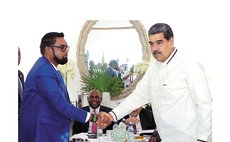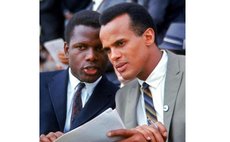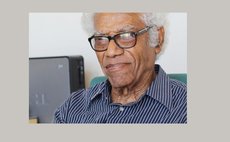Tribute to Sir Alister McIntyre Vice-Chancellor Emeritus 1932 - 2019
"...My stance has always been that, coming from the UWI and later from the CARICOM Secretariat, I had a fundamental obligation to make myself available to all the countries in the region..."
The Caribbean Man: Statement from UWI Chancellor, Robert Bermudez
It is with deep sadness that The University of the West Indies (The UWI) community learnt of the passing of Sir Alister McIntyre, Vice-Chancellor Emeritus, on Saturday, April 20, 2019.
The quintessential Caribbean man, his life was spent in service of the region he called home. An economist by profession, he lectured at the St. Augustine and Mona campuses of The UWI and also served as Director of the Institute of Social and Economic Research, then Director at the United Nations Conference on Trade and Development (UNCTAD), Secretary-General of the Caribbean Community (CARICOM) before becoming Vice-Chancellor of The UWI in 1988.
After his retirement from The UWI a decade later, he continued to serve the region as Chief Technical Advisor to the Caribbean Regional Negotiating Machinery, playing a central role in the region's trade negotiations in several arenas. His was a sterling contribution to regional development from the days of the Caribbean Free Trade Association (CARIFTA) in the 1960s, from the creation of the Caribbean Community (CARICOM) in 1973 to the crafting of the CARICOM Single Market and Economy (CSME) in 1989.
He was also instrumental in ensuring that the Heads of Government of CARICOM recognised the pivotal role played by The UWI in the human resource development of the region and enshrined The UWI in the 1989 Grand Anse Declaration, setting the CSME in motion, as a regional institution in perpetuity.
In addition to the many structural and operational changes to ensure more efficient functioning of the institution that he piloted, Sir Alister initiated the strategic planning process which is now an integral part of The UWI's operations. The region has lost a transformational leader; a giant among men whose contributions to our development shall continue to benefit this generation and generations into the future.
My sincere condolences and those of The UWI community, are extended to his wife Marjorie, their children and grandchildren. The Pioneer: Statement from Chancellor Emeritus, Sir George Alleyne
Grieve we must and grieve we shall. We grieve for ourselves because we have lost the light which Alister McIntyre shone upon the things many of us hold dear.
There are those who will speak eloquently about his skill as an economist and his efforts to have economic analysis inform Caribbean policy. But for our academy his death triggers memories of the good he wrought among and for us.
His legacy to our University of the West Indies is enduring and the many changes he introduced to improve its governance and management are withstanding the test of time.
His image is graven upon the institution in physical and intellectual form. But there is no gift more critical for us and for generations to come than his skill in Grand Anse in 1989 in ensuring that the University would remain a regional institution in perpetuity.
His was an incurable optimist, for while he would sometimes bemoan the fact that many of the good ideas for a vibrant, puissant West Indies would be washed up on the beach of parochialism, he never lost the faith. And that was in part because his heart told him that the growth of tertiary education led by The UWI was a simple heuristic of progress towards the West Indies of his dream.
I trust the acute pain of the presence of his absence will fade for his family and all those who knew him and especially those of us who called him friend. I trust that that pain will be replaced by the glow of gratitude for what he meant and what he did when he laboured among us.
The Visionary: Statement from Vice-Chancellor, Sir Hilary Beckles
I was but a rookie, in UWI years, when Sir Alister, after blazing a global trail, wheeled and returned to the realm as a Caribbean colossus to serve us as Vice-Chancellor. The timing was perfect. His presence powerful and turbulent. Together, they constituted an image reflective of the ground scorching cover drive we had come to expect of Viv Richards.
The academic community, long accustomed to having its way, wished to be wooed. Alister was not the wooing sort. They braced for the anticipated bruising winds of change. His full blown reputation, sown in the richest soils of Caribbean scholarship and matured in the cut and thrust of post-colonial regional political governance, was respected and celebrated in the global corridors of the United Nations. No one doubted that he was a no-nonsense transformative leader. He arrived at the Mona Campus in the August of 1988, but his identity had departed from Geneva for Kingston in May while the poui bloomed; colourful rumours of his selection were everywhere.
It was a most extraordinary summer. The West Indies cricketers defeated England 4-0 in the Test series, against the background of two successive 5-0 "black washings". It was the climax of the 50th anniversary celebrations of the University's service to the region. It was the 20th anniversary of the purging of Walter Rodney from the home campus, an action that opened up in a biblical discursive fashion; what wrong had this brilliant man done to deserve such drastic treatment? And, as fate would have it, Sir Alister arrived at the crease to find that not only was the wicket slippery, but the dark clouds were gathering and the skies were about to open up.
Some called it 'an act of God'. We named it Gilbert. Its fury found and focused upon Jamaica while the Vice-Chancellor was meeting and greeting his colleagues. It blew the roof off the Mona Campus. It wasn't personal; it was September 12th. Thirty-six years had passed since Kingston had felt such ferocity. History and hurricane had huddled to greet the arrival of the man tipped to bring the winds of change.
The Vice-Chancellor then made his debut, on a wicket that was not only sticky but wet and in bad light. Trapped between the looming legacies of the Rodney Affair and the immediacy of Gilbertís despair, the goodly Sir erupted like the SoufriËre he knew. He took control of the crease and stamped his authority at the wicket. The pace of his institutional reforms and transformation was hot like fire.
I was his Dean of Humanities at the distant Cave Hill Campus, long considered in the periphery. He was urged by his cabinet to slow it down, but he had no time for medium pace or middle thinking. He was in a hurry. West Indian society, he said, had no time to waste. Haste, he believed, was necessary to guide our flight from the colonial scaffold. Our golden age, he thought, is in the future, not the past. From the rookies at the base of the academic community came a loud applause.
In short order the traditional, British-style three-term structure of the academic year was blown away and the American oriented semester system became the new order. The modernisation of The UWI had begun. He assembled his leadership team to transform its academic operations, restructure its finances, and raise the standards of academic performance.
The decision to explode the age old ad hoc administration of the regional institution arrived with a big bang, and arising from the dust was something sensational—systematic five-year strategic planning. Leading from the front as a development economist, he took senior and middle management into brainstorming retreats to put the Jurassic world behind us. The University took a giant leap into the world of hands-on development.
He rolled out a road map for the OECS, the sub-region that had been left behind in respect of having a university eco-system to infuse national transformation. University degrees were franchised to their community colleges. He demanded a distance education revolution to facilitate human resource development. He developed an access to higher education which was branded the 'Hub and Spokes' model; The UWI was the hub and community colleges were the spokes.
Simultaneously, he engaged the global space initiative to make his case. The United Nations system was called upon to provide funding for capital works to build capacity across the region in areas of science and technology. The global private sector was tapped for support in constructing new dormitories to secure the expansion of student enrolment from the region and internationally. Within this context, he secured the coveted tax exemption status for the American Foundation for The UWI that has since hosted an annual fundraising gala in New York.
Critically, Sir Alister moved with alacrity to institutionalise a culture of formally rewarding academic, administrative and service efforts. The annual Vice-Chancellor's Awards for Excellence have since been the benchmark for accomplishment recognition. The modern UWI in its management dimensions took sustainable shape, and form within his imagination, orations and actions. In effect, what can be described as 'The McIntyre Moment', born in a hurricane, represents the beginning of a new era. The image, for example, of three landed campuses, stuck in their status as independent-seeking entities, was disrupted and set aside. The new strategic planning process foregrounded the 'One-UWI' principle. In this regard, he might have saved the University from its internal impulse to be too overtly campus-centric.
A generation of academics, leaders, and administrators was schooled in the McIntyre Model and mentality. It is evident today, 21 years after his term, that our strategic planning cycle is still driven by the compelling imperative of economic development and social transformation. His vision, and his mission, remain robustly relevant.
Last year when Times Higher Education ranked The UWI among the best universities worldwide, my first, visceral reaction on receiving the report, was to thank Sir Alister for insisting upon the highest standard. That, I thought, was his greatest gift to us.
The Leader: Principals' Tributes
Prof. V. Eudine Barriteau: Pro Vice-Chancellor and Principal, Cave Hill Campus
The University of the West Indies Cave Hill Campus extends its deepest condolences to the family of Sir Alister McIntyre, a Caribbean statesman, for his exemplary life of service to the region and The University of the West Indies where he served as our fifth Vice- Chancellor.
We celebrate Sir Alister's long tenure as a Caribbean integrationist, development expert, and the Vice-Chancellor who transformed the administrative and academic structures of the University of the West Indies.
Grenada, the Caribbean and The UWI have been enriched by his inspiring and brilliant leadership. May he rest in peace.
Prof. Dale Webber: Pro Vice-Chancellor and Principal, Mona Campus
The legacy of the transformative leader, Sir Alister McIntyre, is synonymous with the phrase: Caribbean development, integration and excellence.
Sir Alister served as The UWI's Vice Chancellor for the period of 1988-1998 and throughout his career at the national, regional and international level, his contributions can only be described as transformational.
The unique quality of foresight in the human experience which urges us to find fulfilment is always relative to tomorrow, meaning we often see fulfilment as achievable in the future, and Sir Alister was no different. He was a firm believer that the work we do today will contribute to the rich legacy on which future generations will build throughout the region and the world.
Sir Alister was never one to accept mediocrity, he knew that if we, the people of the Caribbean, "failed to comprehend that the future requires the best and not just the passable...we would become an ignored or forgotten relic of a past era." He believed that Universities, being centres of enlightenment and understanding, have to fashion responses to the new requirements of the age and point the way forward for the society they serve. The Caribbean experienced the good fortune of Sir Alister devoting his life to this belief. He recognised what he called 'the quiet convulsive change taking place in the world' and selflessly offered himself to serve as one of the architects of what The UWI is today - an institution with the critical mass and the expansive wings that won us high standing in the region and the world.
For me, even with the passage of time, his vision for the Caribbean—one of integration and excellence—will never lose its relevance and for that reason will continue to live on in all The UWI's endeavours for Generations To Come.
Dr. Luz Longsworth: Pro Vice-Chancellor and Principal, Open Campus
The UWI Open Campus joins the rest of the University and the wider region in a celebration of the life and contribution of Vice-Chancellor Emeritus Sir Alister McIntyre. As a strong regionalist, Sir Alister championed the need for the UWI to serve the entire Caribbean in a meaningful and integrated manner. He was visionary in creating the much needed linkages with other tertiary institutions in the region and centering The UWI as an agent for building capacity and empowering sister institutions. The formation of The Association Caribbean Tertiary Institutions (ACTI) in 1990, was a strategic step in pulling our region's educators closer together and one that has led to greater and deeper collaboration throughout the decades.
Although the Open Campus was established some 10 years after his retirement, Sir Alister was firm in his belief that the modern university had to embrace the new information and communication technologies that to create greater access for our people, as well as to open the University to the rest of the world. This vision fueled the growth of distance and online education, the foundation of The UWI Open Campus. We mourn the loss of this Caribbean giant but are so grateful for his commitment and contribution to the development of our University and the region. His was a race well ran. May his wife Lady Marjorie and the rest of his family find comfort in the memories they share of Sir Alister and in the knowledge of the indelible impact that he has left on our Caribbean civilization.
Rest in Peace Sir Alister.
Prof. Brian Copeland: Pro Vice-Chancellor and Principal, St. Augustine Campus
Any meditation on the life of Sir Alister McIntyre is a celebration of Caribbean leadership. Scholar, educator, administrator, policymaker, integrationist, friend and family – he was many things. He was a man who saw the big picture.
At The University of the West Indies, we benefitted enormously from his decade-long leadership as Vice-Chancellor, his time as the Director of the Institute of Social and Economic Research, and his expertise as lecturer in Economics at the Mona Campus and here at St Augustine. Caribbean society itself enjoyed his contribution as Secretary General of CARICOM. Yet underlying these key posts was a singular vision for a strong, prosperous and integrated region.
Sir Alister understood two things that all Caribbean people should know – a unified region is one of our best paths to progress, and The UWI is one of our greatest assets. Perhaps the ultimate expression of his belief in both of these ideas was his role in the Grand Anse Declaration in 1989. In his book The Caribbean and the Wider World: Commentaries on My Life and Career, Sir Alister says of his activities at the Declaration in Grenada that birthed the Caribbean Single Market Economy (CSME):
"I took the initiative to include a paragraph to the effect that The University of the West Indies would remain a regional institution indefinitely. As far as the university is concerned, the relevant paragraph in the declaration represented a re-statement of the regional commitment at a time when some reservations were beginning to be expressed about its continuance as a regional institution. To the present day, most university people do not know exactly how it happened. And I never told them. This is the origin of the retention of the university of its regional status."
We owe Sir Alister a great debt. And the best way to pay it is to continue the work of regional – and institutional – development. The Caribbean is once more in a period of uncertainty – social, economic and even environmental. Once more we need the same ethos of leadership, of creative thinking and capacity to see the big picture. We need to fill the space in our collective regional society that Sir Alister has left vacant with his passing.
On behalf of UWI St Augustine, I extend condolences to the family of Sir Alister and all others that were closest to him. There are few words that can be truly comforting at such a time. I do hope however that we can find some comfort in the knowledge of how deeply Sir Alister has impacted this institution and how much the example he has set inspires us to move forward. The Founder: Statement from the Management of UWI Press
The Board and management of The University of the West Indies Press (UWI Press) are deeply saddened by the recent loss of Vice-Chancellor Emeritus Sir Alister McIntyre. The UWI Press had a special relationship with Sir Alister, whose mission to build a globally renowned university led to the foundation of the UWI Press in 1993.
As a son of the Caribbean soil with a broadly global vision, Sir Alister had the foresight and acumen to realise the vital role of a university press in a growing tertiary institution like The UWI. While there were competing demands for the university's resources, Sir Alister knew that investing in a high-quality academic press would pay dividends in the decades ahead.
The UWI Press stands today as a proud testament to Sir Alistair's vision and we honour his unflagging support over our
Through Sir Alister's commitment, the Press now represents The UWI as a distinguished publisher of award-winning books, promoting both the University itself and Caribbean scholarship in general to the world.
Chair of the Board of the UWI Press, Dr Luz Longsworth says, ìI join with our General Manager Dr Joseph Powell in expressing how honoured the Press was to publish Sir Alistair's engaging and insightful memoirs in 2017. His passion for Caribbean development and the social and economic progress of the people of the region is palpable in each page of his book, and we were delighted that he chose the institution that he founded to be the publisher of his autobiography.
The UWI Press celebrates Sir Alister's role as institution builder, visionary and regionalist, and offers sincere condolences to his family members on their loss.
(The UWI Marketing Department)




